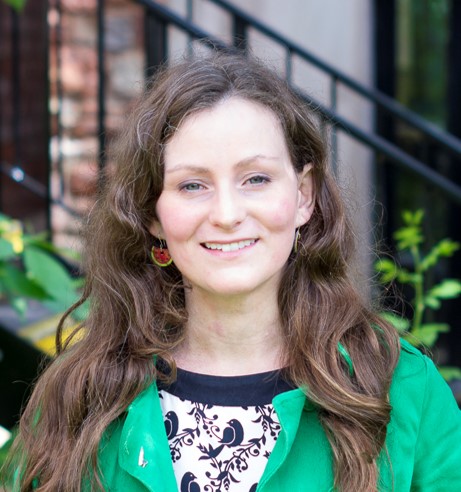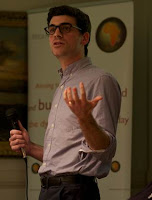This is Bristol: Numerous green businesses and voluntary organisations, a multitude of cyclists, recyclers and circular economists; ethical banking and a local currency; a Council-owned windfarm, Energy Company and low-carbon investment strategy; local food production, community energy, sustainable housing developments. The 2015 EU Green Capital and the owner of the most rapid and extensive decarbonisation ambition of any city or nation in the world.
This is also Bristol: Congestion, polluted air and a polluted harbour, heat-inefficient Victorian homes, fuel poverty and food deserts. Economic inequality magnified by environmental inequality.
Bristol has been a leader in the environmental movement for decades, and it has been a leader in tackling climate change. I’ve been studying climate change for 30 years but am still in awe of the Bristol spirit. And since arriving in Bristol, I’ve tried to help my small bit: I was with George Ferguson in Paris when he pledged carbon neutrality by 2050; I also collaborated on the Council’s Resilience Strategy and, more recently, Marvin Rees’ One City Approach, and especially its environmental theme.
Consequently, I was enthused to see Bristol pass a motion of intent, declaring a Climate Emergency and a desire to become carbon neutral. Carbon neutral across all sectors. By 2030. This is the ambitious Bristol that I love.
And yet I am wary. I am wary that in our fear of catastrophic climate change and in our urgency to declare a Climate Emergency, we fail to build a genuinely inclusive movement. And such a movement is needed to achieve the tremendous change that is required.
We must drive our society towards sustainability, circularity and carbon neutrality. It is necessary to protect our civilisation, to protect all of us and our planet. But most of all, we must minimise climate change because climate change is unjust. It will affect all of us, but it will affect some of us more. It will affect children more than their parents. The young more than the old.
And it will affect the poor, the vulnerable, the isolated – and it will do so not just because of the unfortunate coincidences of geography but because of the structural inequalities in that same society that we are fighting to save. Heat waves kill the poor, they kill outdoor labourers, the working class. Sea level rise will trap, drown and infect the poor, those without the means and wealth to freely move among nations. The volatility of food production will be particularly devastating to those who already struggle to feed their families, who already lean on food banks and charity. Hurricanes and storms will continue to devastate the communities with the least recourse to escape, who likely already live in flood-prone areas, who can be sacrificed, like those in Puerto Rico, with minimal political repercussions.
Climate change is an affront to our putative ideals of fairness and equality. It is classist. It is racist.
But if climate action is a question of social justice, then those marginalised groups must be part of the movement. They must set the agenda of that movement. They must lead the movement. And if they are not, those of us who claim the title ‘environmentalist’ cannot ask why they are not engaged, and instead must ask how we have failed. We must challenge ourselves, our privilege, our dialogue and our institutions and understand how we have excluded them. Have we invited marginalised groups to participate in our events and our agenda? Or have we honestly co-created an open space for multiple agendas? Have we recognised that destroying inequality is a legitimate starting point for fighting climate change? Have we recognised that many of our proposed solutions – entirely rational solutions – can be implicitly racist or sexist?
If we are going to prevent catastrophic climate change, then we must act fast and with unrelenting persistence. But at the same time, we must be patient, check our privilege and listen to those who have been marginalised by past environmental movements. This is especially true because it is those same marginalised groups who will most likely bear the greatest burden of climate change. We assault these groups doubly if we do not centre their voices in our common cause. And because the environmental movement is unstoppable – technologically and socially inevitable and therefore economically inevitable – exclusion from these opportunities is yet a third assault.
I am by no means an expert on co-creating powerful social movements, fuelled by equality amongst the participants and effective in achieving change. But I have been lucky enough to work and learn from those who do. They have shown undeserved patience and understanding and trust.
They taught me that it is vital to recognise not just your own privilege but the economic, historical or social privileges of the institutions one represents. In my case, a world-leading university. In other cases, a business or a trust – even a small green business or cash-starved charity. And even a movement, especially a movement perceived as being by and for the white middle class.
Having recognised that privilege and in many cases the structural racism, sexism and wider inequalities that come with it, it is our obligation to decolonise those institutions rather than to plead for yet more labour from those our institution oppresses. It is our obligation to do our own research and to commit our own emotional energy and labour. And when we do work with marginalised groups, we are compelled to respect their expertise by paying them for their services. Major institutions will pay consultants 100s of thousands of pounds for a re-brand or governance review but ask marginalised groups to help address our diversity challenges by serving for free – by serving on our Boards, attending our workshops, advising on our projects. It is insulting to imply that the privilege of entering our institutions and projects is adequate compensation for their time, their re-lived trauma or their expertise.
Of course, a recognition of the limitations of our institutions, our organisations and our movements is only the start. The next steps involve a fundamental reckoning with the word ‘our’ in those projects – who has owned these, who owns them now, who will own them in the future? And given those answers, are they fit for the challenge at hand? Are they projects capable of becoming genuinely co-owned, co-creative spaces, where not just new members are welcomed but also their new ideas, challenges and perspectives? Or are these projects that must be completely deconstructed, making way for the more energetic ones to come? Do we ourselves have the humility to deconstruct our own projects and cede our labour to those of someone else?
These are challenging questions and the answers are not as simple as I imply. Those of us who have been fighting climate change, plastics in the ocean, toxins in our soil, pollution in the air, and the non-sustainable exploitation of our planet are deeply invested in the struggle and in the solutions we have forged. It is not trivial to patiently draw in new perspectives nor to have our ideas questioned – we have been fighting an establishment for five decades that has been guilty of predatory delay and manipulation of public understanding. We are right to be wary of anything that delays action, right to be uncivil, impatient and intemperate.
But it is also time to concede that a thousand ripples have yet to become a wave. Certainly not the wave needed to dismantle the environmental degradation that has become a near-inextricable feature of our society.
In Bristol, we have the potential to create this wave together. We have a Partnership, a One City Approach and a cross-party ambition without precedent. This is the time to re-invigorate our environmental movement, to align it with our other challenges, to become genuinely inclusive and diverse. It will not succeed with a simple majority, with a mere 52% of the vote. It will have to be a new political project but with an apolitical community that rejects the discourse of division and embraces new and unexpected collaborations.
It will be a community that makes use of all of our talent and is united not with a single strategy or action plan but a common cause and shared values. It will be a community that thrives through a multitude of equally respected agendas.
—————————
This blog is written by Cabot Institute member Professor Rich Pancost, Head of Earth Sciences at the University of Bristol. This blog has been republished with kind permission from the Mayor of Bristol. View the original blog.
 |
| Professor Rich Pancost |




















